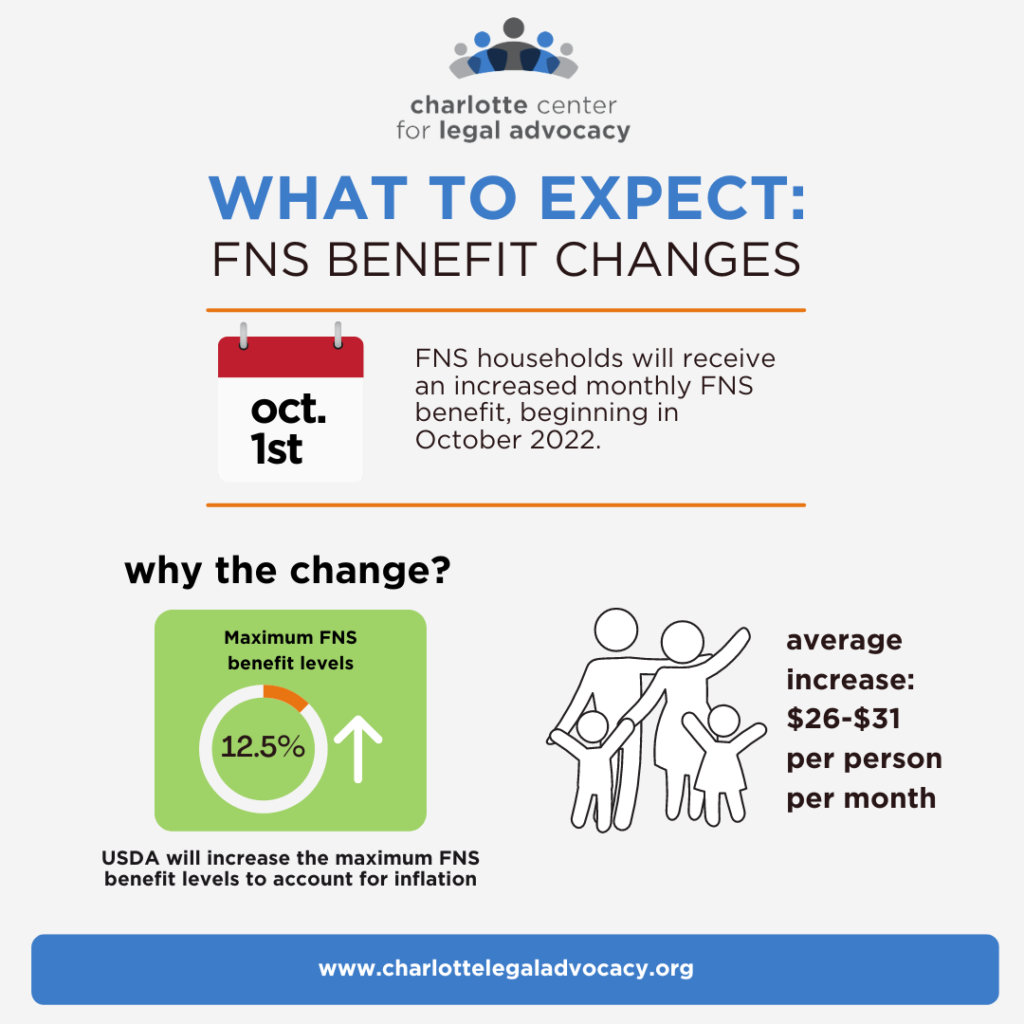¿Qué son las asignaciones de emergencia de cupones para alimentos?
Desde marzo 2020, hogares recibieron $95 o más en beneficios de cupones de alimentos (FNS por sus siglas en inglés) adicionales por mes. Estos aumentos temporales relacionados con la pandemia fueron autorizados por el Congreso para ayudar a satisfacer sus necesidades alimentarias. Debido a la reciente acción del gobierno federal, estos pagos adicionales están terminando. Febrero será el último mes en que recibirán este pago adicional.
¿Qué debo hacer?
Revise la cantidad actual de sus Cupones de Alimentos:
Puede verificar su saldo de FNS /asignaciones de emergencia y el historial de transacciones de tres maneras:
- Visite el sitio web www.ebtedge.com. Haga clic en Inicio de sesión del titular de la tarjeta, cree una cuenta y agregue su número de tarjeta EBT.
- Descargue y use la aplicación móvil EBT Edge (se puede descargar en Google Play o Apple Store).
- Comuníquese con el Centro de llamadas EBT de Carolina del Norte al 1-888-622-7328.
Los beneficios de FNS regulares son depositados entre el día 3 y 21 de cada mes. Las asignaciones de emergencia se depositan a partir del día 22 de cada mes. Febrero será el último mes en que recibirán este pago adicional.
Compare su información:
Si no está recibiendo el beneficio mensual máximo para su hogar, es posible que pueda aumentar su monto de beneficios actualizando su información.
| Miembros del Hogar Elegibles | Beneficio mensual máximo |
| 1 | $281 |
| 2 | $516 |
| 3 | $740 |
| 4 | $939 |
| 5 | $1,116 |
| 6 | $1,339 |
| 7 | $1,480 |
| Cada persona adicional | +$211 |
Reporte cambios que podrían ayudarle a aumentar sus beneficios:
- INGRESOS: ¿Perdió horas de trabajo o le redujeron el salario?
- VIVIENDA: ¿Aumentaron su renta, hipoteca o impuestos de propiedad?
- CUIDADO DE DEPENDIENTES: ¿Está pagando más por el cuidado de niños o el cuidado de un adulto discapacitado?
- GASTOS MÉDICOS: ¿Alguien en su hogar de 60 años o más o que tenga una discapacidad tiene costos médicos más de $ 35 / mes? Esto incluye el costo de servicios médicos, suministros médicos, primas de seguro de salud, copagos, medicamentos recetados y de venta libre, y más.
- PAGOS DE MANUTENCIÓN INFANTIL: ¿Está legalmente obligado a pagar manutención infantil?
- SU DIRECCIÓN: Esto no afectará su nivel de beneficios, pero puede perderse actualizaciones importantes si el Departamento de Servicios Sociales (DSS) no tiene su dirección actual.
Comuníquese con su oficina de DSS local para informar cambios y/o averiguar si su gasto califica como una deducción:
Comuníquese con su trabajador de DSS (si tiene uno), vaya a la oficina de DSS en persona o llame al número de servicio al cliente. También puede apelar si cree que sus beneficios mensuales regulares fueron calculados incorrectamente.
Oficinas locales de DSS:
- Condado de Mecklenburg
- 704-336-3000
- Wallace H. Kuralt Centre, 301 Billingsley Road, Charlotte, NC 28211
- Community Resource Center, 3205 Freedom Drive, Charlotte, NC 28208
- Condado de Union
- 704-296-4300
- 2330 Concord Avenue Monroe, NC 28110
- Condado de Cabarrus
- 704-920-1400
- 1303 S. Cannon Blvd. Kannapolis, NC 28083
Si algo malo sucede, comuníquese con un defensor:
Si ha seguido los pasos anteriores y aún piensa que algo está mal con su caso de cupones de alimento, comuníquese con un representante legal para obtener ayuda.
El Centro de Apoyo Legal de Charlotte
(Condado de Mecklenburg)
704-376-1600 | Linea de Español 800-247-1931
Asistencia Legal de Carolina del Norte
(en todo el estado excepto en condados atendidos por el Centro de Apoyo Legal Charlotte y Servicios Legales Pisgah)
866-219-LANC (5262) | legalaidnc.org
Servicios Legales de Pisgah
(Condados de Avery, Buncombe, Burke, Cherokee, Clay, Graham, Haywood, Henderson, Jackson, Macon, Madison, McDowell, Mitchell, Polk, Rutherford, Swain, Transylvania, y Yancey, Qualla Boundary)
800-489-6144 | pisgahlegal.org
¿Qué otros recursos alimentarios están disponibles?
- WIC: Si tiene un hijo/a menor de 5 años y/o está embarazada o amamantando, puede ser elegible para WIC. Obtenga más información sobre WIC y complete una referencia de WIC en línea en https://www.ncdhhs.gov/ncwicreferral.
- 211: Visite nc211.org o marque 211 para conectarse con recursos alimenticios comunitarios.
- Despensas de alimentos: puede encontrar despensas de alimentos locales visitando https://www.foodpantries.org/.
- NC Care 360: Solicite ayuda o busque recursos haciendo clic en la pestaña “For Individuals” en https://nccare360.org/.
- FindHelp: Encuentre comida y otros recursos https://www.findhelp.org/.


